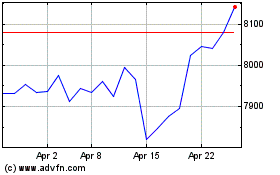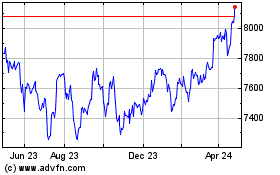U.S. Bank Shares Fall, European Stocks Slide on Political Uncertainty
April 18 2017 - 11:25AM
Dow Jones News
By Akane Otani and Mike Bird
Major stock indexes fell Tuesday, weighed by a slide in bank
shares.
The Dow Jones Industrial Average lost 84 points, or 0.4%, to
20553. The S&P 500 fell 0.2% and the Nasdaq Composite lost
0.2%.
Stocks have faltered in recent weeks as a pickup in political
uncertainty in both the U.S. and elsewhere drove investors into
haven assets like gold and U.S. Treasurys.
More than 60 firms in the S&P 500 are expected to report
earnings this week, according to FactSet, including several banks
and industrial companies. Continued signs of corporate health will
be key to stocks moving higher, analysts and investors say.
"The market's taken a bit of a pause lately, and part of that
has to do with markets in the U.S. being at the high end of
valuations," said Mark Watkins, regional investment strategist at
the Private Client Group at U.S. Bank in Park City, Utah. "If we
see earnings that miss or are below expectations, that could be a
warning sign."
Bank stocks slid Tuesday after a disappointing earnings report
from Goldman Sachs Group, whose first-quarter trading results fell
short of those posted by its rivals. Shares of Goldman Sachs fell
3.9%. The KBW Nasdaq Bank Index of leading U.S. commercial lenders
lost 0.6%.
Bank of America shares initially traded higher, but were
recently down 0.4%, after the company reported a
higher-than-expected first-quarter profit and revenue that beat
analysts' expectations.
Declines in health-care stocks put further pressure on major
indexes, with Johnson & Johnson shedding 3.3% after the company
posted underwhelming sales in the latest quarter. Health-care
stocks fell 1% in the S&P 500.
Government bonds gained, with the yield on the 10-year U.S.
Treasury note falling to 2.205%, according to Tradeweb, from 2.248%
Monday. Yields fall as bond prices rise.
Elsewhere, European stocks dropped after British Prime Minister
Theresa May said she would call an early general election, a move
some analysts interpreted as an effort to get more leeway in
upcoming exit negotiations with the European Union.
The Stoxx Europe 600 index fell 0.9% and U.K.'s export-heavy
FTSE 100 lost 2.2%, weighed by a rally in the pound.
The U.K. currency jumped 1.4% against the dollar to $1.2740. A
stronger pound typically weighs on the FTSE 100, since it cuts into
sterling-denominated earnings.
"It seems like people are focusing on the positives. The
straightforward assumption is that she'll win the election and
consolidate her control over parliament," said Viraj Patel, foreign
exchange strategist at ING.
"But this also opens up a big new element of uncertainty, which
could reinforce the case for sterling weakness," he added.
In Asia, the Shanghai Composite Index closed down 0.8% in its
third consecutive session of losses. Hong Kong's Hang Seng Index
fell 1.4%, its largest one-day decline since December.
--Kenan Machado contributed to this article.
Write to Akane Otani at akane.otani@wsj.com and Mike Bird at
Mike.Bird@wsj.com
(END) Dow Jones Newswires
April 18, 2017 11:10 ET (15:10 GMT)
Copyright (c) 2017 Dow Jones & Company, Inc.
FTSE 100
Index Chart
From Mar 2024 to Apr 2024

FTSE 100
Index Chart
From Apr 2023 to Apr 2024
